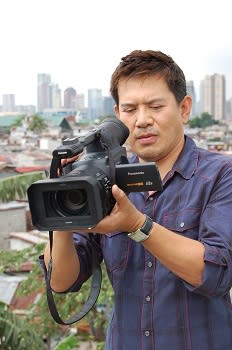The Mindanao hostage saga according to Brillante Mendoza

By Pablo A. Tariman, VERA Files
The first Filipino filmmaker to win the best director trophy at the Cannes Film fest is taking a new look at the recurring cycle of hostage-taking in Mindanao.
In his latest film, "Captive" (set to open September 5 in theater in Metro Manila), Brillante Mendoza takes a respite from his past subjects of gruesome murders ("Kinatay"), sleazy massage parlors ("Masahista") and sex-ridden theaters ("Serbis") for a new project which could be dubbed as timely as recent headlines.
Ironically, the film was first seen in this year's edition of the Berlin Film Festival where it was one of the notable films in competition.
What makes this film exciting is the presence of celebrated film actress Isabelle Huppert who bagged the Cannes best actress trophy for her role in "The Piano Teacher" many years back. Huppert was also head of the Cannes film jury that gave the Filipino his first best director trophy in the most prestigious film fest in France.
The earlier Isabelle Huppert starrer -- "The Piano Teacher" -- was a real shocker for Manila's conservative musicians and music lovers. But they loved the film's concert scenes where the famous Schubert interpreter played by Huppert mentors a highly promising pupil (played by Benoît Magimel, another Best Actor in Cannes for this film) and they end up as unlikely, nay, shocking lovers.
If "Kinatay" (the picture won best director of Mendoza in Cannes) was about rape, murder and dismemberment, "The Piano Teacher" was about sexual repression, recurring sexual fantasies and "moral" dismemberment of a highly promising pianist by his own teacher played by Huppert. Written and directed by Michael Haneke based on the novel by Elfriede Jelinek, "The Piano Teacher" won not just the best actress trophy for Huppert but also the Cannes best picture honor in Cannes.
Mendoza reveals he met Huppert in Portugal the year after he won in Cannes. " I asked her if she was interested to work with me in a film," he recalls. " I broached the idea of doing a film about the Abu Sayaf kidnapping in Dos Palmas. She immediately got interested in her role as the French missionary abducted by the extremist group."
When he set out to shoot the film, he decided not to dramatize it and simply tell the story from his point of view. And while it is about a socio-political problem constantly happening in the southern borders of the country, he likes to think that his film goes beyond reportage.
" It is my intent to show a tapestry of emotions and behaviors as to why this dastardly act (of taking hostages) is committed. But in the end, what could prevail are the person's decision and conviction either to do good or bad," he explains.
Brillante says he wanted to show a concern that has become global and plagues everybody. Although the hostage-taking happened in the Philippines by Filipinos, involvement of foreign characters made the issue global. "Taking into account all these factual events, what to me is more essential, is the fact that we are all 'victims' in a larger scheme of things. We become insignificant when placed in a bigger picture, especially when we are faced up with nature's rage."
The filmmaker points out that the film is not just about hostage-taking but more on the survival capacity of a human being in an extreme situation: "Because on the whole, my films are basically about the lives of real ordinary people in an extraordinary situation. It is also about human survival. It shows how each person reacts to a situation where nature can be harsh and human can become merciless given an extremely complicated situation. It also reveals the different aspects of human understanding of danger and death, life and love, dilemma and decision, and faith and hopelessness. In the end, there are only two choices: to become either a captive or a captor."
This is Brillante's first experience working with a celebrated foreign film star and he describes is as "simply awesome. "
" She's a great and a generous actress and very professional. She knows what she wants, exacting but generous. Once the scene was explained to her, she gives it all. She knows how to pace herself and has a deep understanding of her craft. Her ability to be consistent in portraying her role is remarkable," he talks of Hupert adding that he surmised the actress was surprised with his instinctive style of film making. "I allow things to unfold and give all the elements in the scene to just grow and shine," he says.
Thus far, Mendoza has directed total of ten films most of which received awards, prizes and citations from film jury in different film festivals all over the world.
For him, awards are mere symbols of outstanding recognition and they have tenure. "You may be recognized this year, but the year after that could be another person who would be given the award. Awards should serve as a reminder to strive harder to live up to the expectations those awards represent."
On the whole, he was very proud of the Filipino actors (Ronnie Lazaro, Madeleine Nicolas, Sid Lucero, Sherry Lara, Rustica Carpio) in "Captive." "Isabelle Huppert was all praises for them," he adds.
The respect and admiration were mutual made easy by the Filipino's innate hospitality."Our actors were also amazed at how Isabelle generously gave so much of herself in the film. It was an instant symbiotic relationship," Brillante shares.
(VERA Files is put out by veteran journalists taking a deeper look at current issues. Vera is Latin for "true.")
-->



